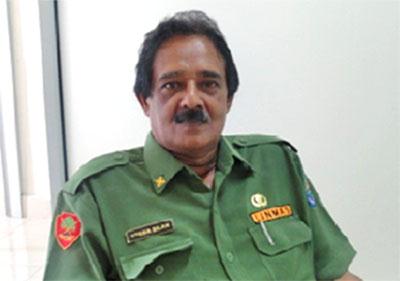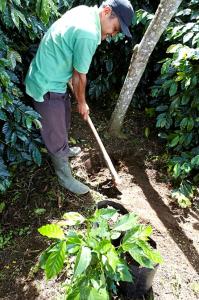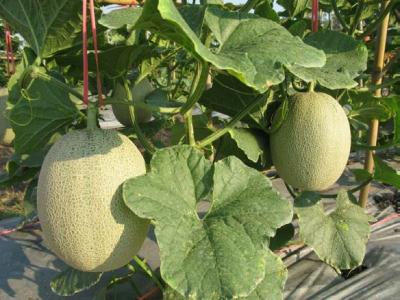Special Interview with Mr. Utema Silan
Last updated: 13 December 2013 | 10:31

Mr. Utema has been working for the Dinas Pertanian Agricultural Service of North Sumatra, Indonesia since 1981. With a wealth of experience in the Plant Protection Division, Mr. Utema is now responsible for developing research on bio-control for staple foods and horticultural crops at the Agricultural Service in North Sumatra.
What kind of services does your organization provide to farmer/smallholder groups?
Normally, our organization performs four key functions. First, we do field observations in farmer’ s fields in order to get current situational data on pests and diseases in the area and this data is then analysed in order to provide the best advice or recommendations to farmers in managing pests and diseases. Secondly, we provide training to farmers, through farmers groups, on pest and disease management with an emphasis on biological control. The training programme started with basic knowledgeabout biological control (theory) up to field practices. Following on from the training initiative, we also established plant clinics in several villages to provide centres of information on pest and disease control, covering the areas of identification, diagnosis and control. Moreover, the organization provides facilities and equipment for farmers, through farmers groups, to produce their own biocontrol agents via Biocontrol Development Centres in several villages.
What is your participation in the ASEAN Biocontrol Project?
As you may know, the ASEAN Biocontrol Project is a regional programme and Indonesia is one of among ten ASEAN countries taking part. Connecting to the farmers and the transfer of knowledge is very important. My part is exploiting the existing agricultural networks and cooperatives to reach directly to farmers in North Sumatra. I act as a training resource person for the Integrated Public Private Partnership (iPPP) and I am involved in the establishment of a training centre on how to grow horticultural crops in highland areas on an ecological basis by using biological inputs at an agro tourism facility, the Taman Simalem Resort. In this respect, the main tasks are to train both staff at the Taman Simalem Resort and farmer groups, and to establish a laboratory. I will contribute to promote good agronomic practices with an emphasis on using biological pesticides for managing fruit fly infestation in orange farms belonging to smallholders. This will happen at the beginning of 2012 under the iPPP in North Sumatra, Indonesia.
From your perspective, what is the situation on using pesticides in Indonesia and what is the trend in the use of bio-pesticides?
 Farmers’ knowledge about the“ green environment” and green issues improved quickly after the Farmers Field Schools programmes were conducted at the beginning of the 1990’ s when farmers were trained in how to grow crops properly with an emphasis on an eco-friendly approach, for example reducing pesticide use and promoting biocontrol as an alternative. The farmers already understood the adverse effects of pesticides and they also knew that there were other alternatives such as biocontrol agents.However, the accessibility or availability of this alternative is very limited, unlike chemicals. We still need more continuous effort to promote biocontrol agent use through training courses and government and private sector media campaigns. The high demand for pesticide-free or organic products is a great incentive for farmers to use bio-pesticides. It benefits the farmers economically, and indeed some of them realize that it also keeps their farms clean, healthy and keeps the ecosystem in harmony. The potential of bio-pesticides use is high but again more comprehensive support is needed from various actors such as governments, NGOs, the private sector and buyers/consumers.
Farmers’ knowledge about the“ green environment” and green issues improved quickly after the Farmers Field Schools programmes were conducted at the beginning of the 1990’ s when farmers were trained in how to grow crops properly with an emphasis on an eco-friendly approach, for example reducing pesticide use and promoting biocontrol as an alternative. The farmers already understood the adverse effects of pesticides and they also knew that there were other alternatives such as biocontrol agents.However, the accessibility or availability of this alternative is very limited, unlike chemicals. We still need more continuous effort to promote biocontrol agent use through training courses and government and private sector media campaigns. The high demand for pesticide-free or organic products is a great incentive for farmers to use bio-pesticides. It benefits the farmers economically, and indeed some of them realize that it also keeps their farms clean, healthy and keeps the ecosystem in harmony. The potential of bio-pesticides use is high but again more comprehensive support is needed from various actors such as governments, NGOs, the private sector and buyers/consumers.
In which area do you think the ABC project can support smallholders achieve sustainable eco-friendly farming?
 This is quite interesting. The project can support smallholders directly and indirectly.Directly through technical and non-technical training (community development), media campaigns and support in-field trials in order to gain access to bio-pesticides and to strengthen the knowledge and confidence of the farmers in the use of bio-pesticides.Indirectly, it can be achieved through providing market access (buyers) for their agricultural products; and also through initiatives that help the private sector (biocontrol inputs companies) to produce high-quality bio-pesticides at a reasonable price.In terms of crops, I think rice, vegetable and fruit cultivation should be put as a priority agri-food sector in our area.
This is quite interesting. The project can support smallholders directly and indirectly.Directly through technical and non-technical training (community development), media campaigns and support in-field trials in order to gain access to bio-pesticides and to strengthen the knowledge and confidence of the farmers in the use of bio-pesticides.Indirectly, it can be achieved through providing market access (buyers) for their agricultural products; and also through initiatives that help the private sector (biocontrol inputs companies) to produce high-quality bio-pesticides at a reasonable price.In terms of crops, I think rice, vegetable and fruit cultivation should be put as a priority agri-food sector in our area.